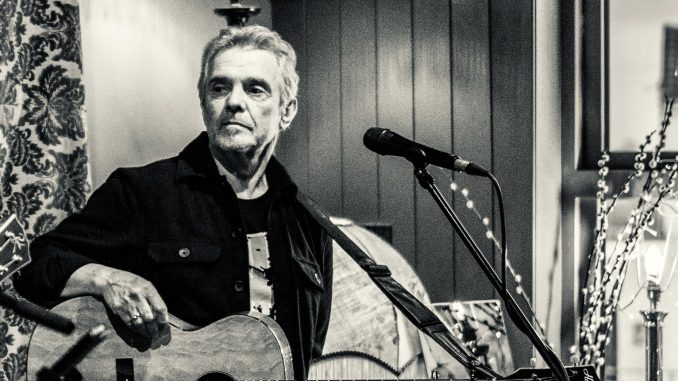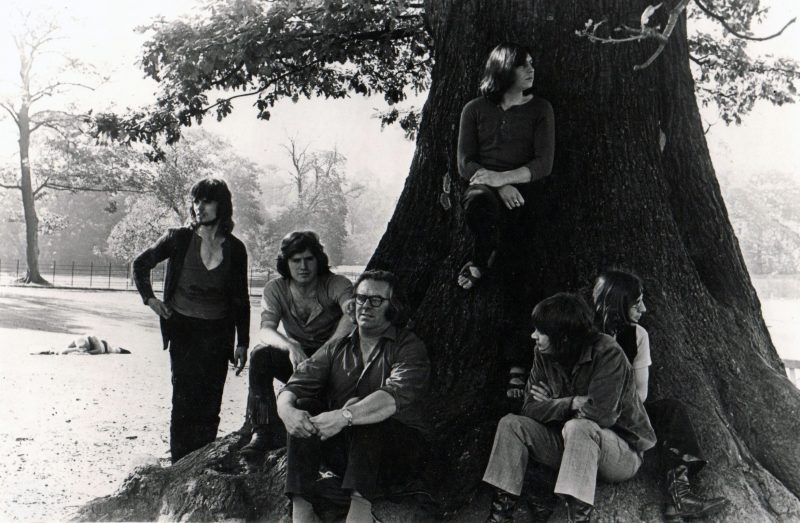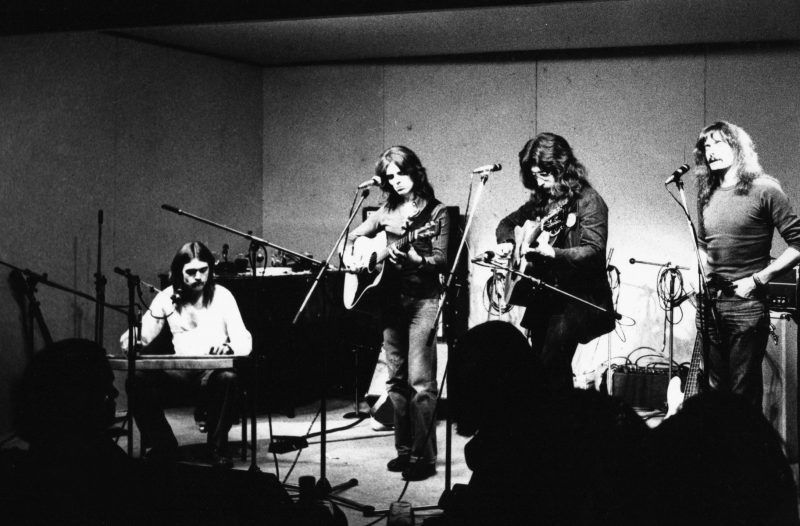
There will be those that will raise a quizzical eyebrow to see Iain Matthews’ name on an article about key names in the americana music genre but I would argue that, in the UK and wider continental Europe, he is an extremely important and influential figure who doesn’t receive the recognition he is due.
Born Ian Matthews MacDonald in Barton-Upon-Humber, in the county of Lincolnshire in 1946, he was originally known as Ian MacDonald but took his mother’s maiden name, Matthews, in 1968 to avoid confusion with Ian McDonald of King Crimson. In 1989 he formally changed the spelling of his first name to Iain. He originally came to prominence as a member of Fairport Convention, recruited by Ashley Hutchings, late in 1967, to provide a male counterpoint to the voice of Judy Dyble. At this time, Fairport Convention saw themselves as a British Jefferson Airplane and concentrated on covers of mainly American songs, something that played to Matthews’ strengths as a student of American music. When Sandy Denny replaced Dyble as the female voice of Fairport, it saw a significant shift in the focus of the band and one that would signal the end of Matthews’ tenure within the group.
Over the years there have been suggestions that he was ousted because his voice and Sandy Denny’s didn’t work well together but you only have to hear the superb ‘Thro’ My Eyes’ from his 1971 solo album ‘If You Saw Thro’ My Eyes’ to know nothing could be further from the truth. The simple fact is that Tyger Hutchins was The Guvnor in those days and he had a vision for Fairport Convention that didn’t include Iain Matthews and his preference for American music. Now, this is where it starts to get interesting. Rather than fading away and accepting that he was surplus to requirements, Matthews decided that he had a vision of his own and that was to bring his interpretation of American folk and country music to British audiences. If you’ve seen the interview I did with Iain last year, he dismisses the view that he was influential in bringing what we now term americana to British audiences, claiming that “There were others doing the same thing. Brinsley Schwartz for one….I was simply taking what I heard and making listeners aware of its existence”. I think this belies the importance of the music Iain started to put out immediately after leaving Fairport Convention. His version of the Joni Mitchell song, ‘Woodstock’, released in 1970 and spending 3 weeks at the top of the UK charts, was unlike anything anyone had previously heard from a British band. He put pedal steel guitar front and centre of his arrangement at a time when you only heard pedal steel on American country records. Bands like Brinsley Schwarz may well have been mining a similar musical seam but they weren’t topping the UK charts with the results. Matthews based his version on the Joni Mitchell original, but re-arranged it to make it a more comfortable fit for his own voice. Interestingly, Mitchell has said she prefers Matthews’ arrangement to her own original one.

For me, the Mathews’ Southern Comfort version of ‘Woodstock’ was a hugely influential single release (it was, originally, only released as a single, following public reaction to the band including it in a BBC live radio broadcast). It was released in the same year as both the Joni Mitchell original and the CSN&Y cover, yet it totally eclipsed those other versions throughout Europe and had significant success in other markets. The band’s record label were aware of the competition and only agreed to release it as a single if the CSN&Y version failed to chart in the UK, which it did. ‘Woodstock’ is also important because it set Matthews himself on a different track. Until this point, he had been more of an interpreter of songs than a creator of songs. It was the commercial success of ‘Woodstock’, and all the media attention that came with it, that helped Matthews to realise he wanted to be a working musician much more than he wanted to be a star. He promptly quit his own band to concentrate on his writing and bringing his version of the American troubadour tradition to the British public. This marks the next phase of his americana development and the release of his first real solo album, “If You Saw Thro’ My Eyes”, now regarded as something of a British americana classic. Featuring previous Fairport bandmates Richard Thompson and Sandy Denny, and marking the first time he would work with future bandmate, Andy Roberts, this is the album that sees Matthews start to emerge as a songwriter and shows the heavy influence of American music on his own compositions. Notably, of the three non-Matthews compositions on the album, two are by Richard Farina, the one writer who probably had more influence on Matthews than any other.
1971 was a pivotal year for Matthews and, I would suggest, for British americana. He released two solo albums, ‘If You Saw Thro’ My Eyes’ and the equally impressive ‘Tigers Will Survive’ before embarking on his next band project and one that would have long-term impact on Matthews’ own career and on the development of americana music in the UK and Europe. With Andy Roberts, Iain Matthews now formed Plainsong, recruiting English pianist and guitarist Dave Richards and American bass player, Bob Ronga. In my opinion, Plainsong can be seen as a British response to American bands like CSN&Y and few people who heard them were less than hugely impressed – for a British band to be producing an album like ‘In Search of Amelia Earhart’ in 1972 was little short of amazing. It’s worth quoting Cameron Crowe’s 1972 review, from the San Diego Door, almost in its entirety, to get some idea of the impact of this album at the time –
“ In Search of Amelia Earhart is, and let us not mince words, the finest display of gentle, sometimes liltingly so, English folkiness and rockabilly to surface in a long while. Too long. Not a surprising fact considering Plainsong is the newest project of Ian Matthews, late of Matthews Southern Comfort and two fine solo efforts If You Could See Through My Eyes and Tigers Will Survive.
While David Bowie is being wildly applauded for his choice of concepts musically explored in Ziggy Stardust…the rise and fall of a pop star, it is distressing to consider that Plainsong just might not gain the respect they deserve for choosing the topic of Amelia Earhart as a concept album. While the songs on the LP do not directly confront the issues of her mysterious disappearance as bluntly as, say, John Prine would if it were his project, the lyrics deal with the images and feelings that permeated the whole event of her flying around the world…..Make no mistake about it. Plainsong is not Ian Matthews…Plainsong is four English folkies experienced in their method of attack and style. Hopefully In Search of Amelia Earhart is representative of the brilliant recordings forthcoming from this band. Bravo.”

I remember being absolutely blown away by this album at the time it came out, sitting around with friends and listening to the exquisite harmonies and pouring over the words of each song. As someone who had spent a large amount of his youth in various folk clubs, it made me completely re-evaluate the folk tradition and the importance of American music in creating a roots music with a broader appeal. I would say that, if I had to identify one British record that set me on a path toward what we now call americana music, then this would be it. I think it’s fair to say that, if this album came out in today’s market, it would be universally well received. It’s an album well ahead of its musical time and it’s particularly unfortunate that the original Plainsong lineup only released the one album. As Iain said in his interview, “Plainsong is a great example of something gone wrong, because of youth and naïveté and left to simmer, came back together even stronger. A phoenix of sorts. It’s more about the creative force. Something magical happens when Andy and I work together, even if it is occasional.” The reality is that, while Plainsong was never just Iain Matthews it was always about the creative bond between Iain and Andy Roberts and that’s why Plainsong has been able to come back in later incarnations of the band and still have relevance and resonance. This is something that was obvious with the most recent release under the Plainsong name, 2015’s “Reinventing Richard: The Songs of Richard Fariña”, where the songs of late American songwriter, author, and icon of the 60s counter-culture, Richard Fariña, were given a 21st Century update by Matthews and Roberts, working again with 1990s Plainsong member Mark Griffiths.
After the original Plainsong broke up in 1973, Matthews relocated to the U.S. where he continued his education in American roots music, recording a number of solo and band albums and initially living and working in Texas before relocating to Seattle, in the North West. Matthews finally tired of life in America, leaving in the year 2000 and returning to Europe, though not to the UK. He has been resident in Holland since he returned, a country where his music was always appreciated and where he has continued to live and work for the last 23 years. Unsurprisingly, the Netherlands has a thriving americana scene of its own.
 It seems to me that, though what we call americana music is, obviously, drawn from the American roots tradition, it is, increasingly, developing different identities outside the U.S. When you listen to music in the americana genre that comes from the Netherlands, or Ireland or the Scandinavian countries, you can hear that it has its own identity, something that marks it out from music produced in America itself. I think this is particularly true of British americana and, while he would deny it himself, I think Iain Matthews is one of the principal architects of what has become a British americana sound. Matthews still records and performs, both under his own name and as Matthews Southern Comfort, and Plainsong are still an option for future work, Iain and Andy having done a handful of small gigs in the UK at the end of 2022.
It seems to me that, though what we call americana music is, obviously, drawn from the American roots tradition, it is, increasingly, developing different identities outside the U.S. When you listen to music in the americana genre that comes from the Netherlands, or Ireland or the Scandinavian countries, you can hear that it has its own identity, something that marks it out from music produced in America itself. I think this is particularly true of British americana and, while he would deny it himself, I think Iain Matthews is one of the principal architects of what has become a British americana sound. Matthews still records and performs, both under his own name and as Matthews Southern Comfort, and Plainsong are still an option for future work, Iain and Andy having done a handful of small gigs in the UK at the end of 2022.
Iain himself will be doing a series of shows later this year. Billed as ‘An Intimate Evening With Iain Matthews’, you’ll be able to judge for yourselves just how much he has contributed to a British americana sound at these venues –
Check the Iain Matthews website for additional information and any updates. http://iainmatthews.nl



I’ll be at the Southport show barring any unforeseen disasters over the next six months. With the Plainsong box set, another Southern Comfort album supposedly coming later in the year and this tour no one can accuse Iain of sitting on his laurels.